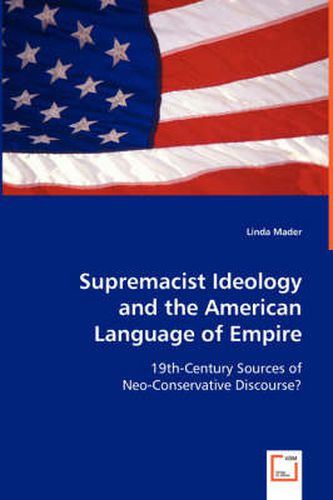Readings Newsletter
Become a Readings Member to make your shopping experience even easier.
Sign in or sign up for free!
You’re not far away from qualifying for FREE standard shipping within Australia
You’ve qualified for FREE standard shipping within Australia
The cart is loading…






This title is printed to order. This book may have been self-published. If so, we cannot guarantee the quality of the content. In the main most books will have gone through the editing process however some may not. We therefore suggest that you be aware of this before ordering this book. If in doubt check either the author or publisher’s details as we are unable to accept any returns unless they are faulty. Please contact us if you have any questions.
At the end of the 19th century, an influential group of Americans argued for the extension of U.S. control over foreign territory by force-ful means. A century later, so-called neo-conservatives advocated a policy of strength to ensure continued U.S. global dominance. The groups of both time periods were ready to use American power in order to impose their interests upon others, and to disregard national sovereignties and other nations’ concerns in the pursuit of their goals. Their discourse - the American language of empire - makes the case for and supports the extension of U.S. control, military intervention abroad, disregard for international law, and a longer-term occupation of foreign territory. This study draws on methods of Critical Discourse Analysis (CDA) in order to analyze how the American language of empire justifies power, and whether or not the language of the 21st century bears remnants of the language of the 19th century. The author identifies six constitutive elements of the American language of empire. As CDA is an interdisciplinary approach, this book, originally an MA thesis, is addressed to Americanists as well as linguists, political scientists and historians.
$9.00 standard shipping within Australia
FREE standard shipping within Australia for orders over $100.00
Express & International shipping calculated at checkout
This title is printed to order. This book may have been self-published. If so, we cannot guarantee the quality of the content. In the main most books will have gone through the editing process however some may not. We therefore suggest that you be aware of this before ordering this book. If in doubt check either the author or publisher’s details as we are unable to accept any returns unless they are faulty. Please contact us if you have any questions.
At the end of the 19th century, an influential group of Americans argued for the extension of U.S. control over foreign territory by force-ful means. A century later, so-called neo-conservatives advocated a policy of strength to ensure continued U.S. global dominance. The groups of both time periods were ready to use American power in order to impose their interests upon others, and to disregard national sovereignties and other nations’ concerns in the pursuit of their goals. Their discourse - the American language of empire - makes the case for and supports the extension of U.S. control, military intervention abroad, disregard for international law, and a longer-term occupation of foreign territory. This study draws on methods of Critical Discourse Analysis (CDA) in order to analyze how the American language of empire justifies power, and whether or not the language of the 21st century bears remnants of the language of the 19th century. The author identifies six constitutive elements of the American language of empire. As CDA is an interdisciplinary approach, this book, originally an MA thesis, is addressed to Americanists as well as linguists, political scientists and historians.